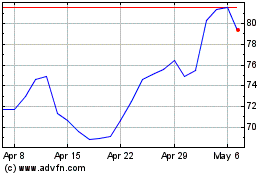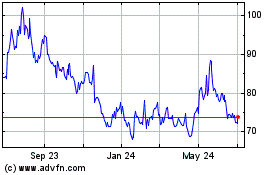By Stella Yifan Xie, Jing Yang and Ian Talley
A window is closing for Chinese financial-technology giant Ant
Group Co. to pull off a record-breaking initial public offering
ahead of the U.S. presidential election, as regulators in mainland
China and Hong Kong have yet to sign off on the company's plans to
go public.
Ant, the owner of popular Chinese mobile-payments network Alipay
and the world's most valuable startup, in August filed IPO
documents with stock exchanges in Hong Kong and Shanghai. The
company could raise more than $30 billion in the concurrent
offerings and earn a market valuation between $200 billion and $300
billion, The Wall Street Journal previously reported.
Hangzhou, China-based Ant, an affiliate of Alibaba Group Holding
Ltd., was earlier targeting to list its shares in both markets by
late October, according to investors who were briefed by bankers
working on the sale.
Some company insiders had also wanted to complete the IPO before
the U.S. elections on Nov. 3, to avoid running into potential
choppy financial markets in the ensuing days and weeks, according
to people familiar with the matter. Tensions between the U.S. and
China have also been high, and could escalate depending on the
election outcome.
Spokespeople for Ant have previously said there was never a
formal timetable for its listing. A spokeswoman declined to comment
Friday.
That is now looking unlikely, even though the Shanghai Stock
Exchange in mid-September greenlighted Ant's listing plans. The
stock exchange of Hong Kong has yet to hold a hearing to determine
whether the offering can proceed, and the deal also needs a signoff
from the China Securities Regulatory Commission before Ant can
start selling its shares on the mainland.
Ant will be the first Chinese company in a decade to list in
both markets at the same time, and coordinating the two efforts is
proving to be a complicated process. In Hong Kong, companies
typically take about two weeks to go public from the time they
launch their offering after getting a green light from the
exchange.
Even though Ant's dual IPOs will bypass the world's largest
exchanges in America, and the company has very little business in
the U.S., worsening relations between the two countries have placed
Ant in the crosshairs of potential attempts by the Trump
administration to curb the company's activities. Three major U.S.
investment banks are among the sponsors of the Hong Kong leg of
Ant's IPO.
The U.S. State Department recently proposed that Ant be added to
the Commerce Department's so-called entity list, which is designed
to prevent companies from exporting sensitive technology abroad,
according to a person familiar with the matter. News of the
proposal was earlier reported by Reuters.
The entity list, in essence a trade blacklist, restricts the
export, re-export or transfer of technology and other items that
include weapons. Dozens of Chinese companies are already on the
list, including telecom giant Huawei Technologies Co.
A year ago, Megvii Technology Ltd., a Beijing-based developer of
facial-recognition technology, was among eight companies that were
added to the list. Megvii, which Ant owns a minority stake in, at
the time was preparing for an IPO in Hong Kong, which, like the Ant
deal, was led by U.S. banks.
The IPO was postponed after Megvii's underwriting banks became
lukewarm about the deal in light of the U.S. government ban, the
Journal previously reported.
It is unclear what security justification the U.S. would have
for adding Ant to the entity list. An interagency panel of
representatives from the Departments of State, Defense, and Energy
-- and chaired by a Commerce officer -- must consider the proposal
within 30 days of its submission. A majority of representatives
have to approve the proposal for Ant to be added to the entity
list.
Most of Ant's business is in China, where Alipay has more than
one billion users and handled 118 trillion yuan, equivalent to
$17.6 trillion, in payment transactions in the 12 months to
June.
Last year 5.5% of Ant's 120.6 billion yuan in revenue came from
abroad, according to its listing prospectus. Ant earlier scaled
back ambitions to expand in the U.S. after a failed $1.2 billion
bid for MoneyGram International Inc. that was blocked on
national-security concerns in 2018.
In 2016, Ant acquired Kansas City, Mo.- based EyeVerify Inc.,
which provides biometric verification technology, for an
undisclosed amount.
In the U.S., Alipay has tie-ups with Walgreens Boots Alliance
Inc. and other retailers to provide its network as a payment option
for Chinese shoppers with Alipay digital wallets that are linked to
their bank accounts in China. It can't be used by non-Chinese
citizens outside of China.
Ant hasn't been notified of any State Department proposal, and
the company hasn't had any interaction with U.S. government
officials on the issues, according to people close to the
company.
Martin Chorzempa, a research fellow who follows China's
financial sector at the Peterson Institute for International
Economics, said that unlike the addition of China's Huawei and its
subsidiaries to the blacklist, there are no accusations he is aware
of that Ant has violated any U.S. laws.
"This fits into the general pattern of wanting to look really
tough on China by taking symbolic actions that don't have a strong
negative effect -- but make a lot of noise," said Mr.
Chorzempa.
Shaun Wu, a Hong Kong-based attorney at Paul Hastings LLP, said
the Trump administration has increasingly shown that it is willing
to impose tough restrictions or even prohibitions on Chinese tech
giants, in particular.
But, there is no prohibition on U.S. investors buying shares in
companies that are on the entity list, said Mr. Chorzempa, adding
he doesn't believe the threatened listing will deter them. Ant's
coming IPOs have already drawn substantial interest from big
investors from the U.S. to Asia, according to people familiar with
the matter.
Banks handling the sale have been in discussions with
institutions that plan to subscribe for shares in the IPO, and five
big asset managers in China recently closed new mutual funds that
could invest as much as six billion yuan in the Shanghai leg of the
offering. Millions of Alipay users invested in those new funds.
--Xie Yu contributed to this article.
Write to Stella Yifan Xie at stella.xie@wsj.com, Jing Yang at
Jing.Yang@wsj.com and Ian Talley at ian.talley@wsj.com
(END) Dow Jones Newswires
October 16, 2020 13:53 ET (17:53 GMT)
Copyright (c) 2020 Dow Jones & Company, Inc.
Alibaba (NYSE:BABA)
Historical Stock Chart
From Mar 2024 to Apr 2024

Alibaba (NYSE:BABA)
Historical Stock Chart
From Apr 2023 to Apr 2024
